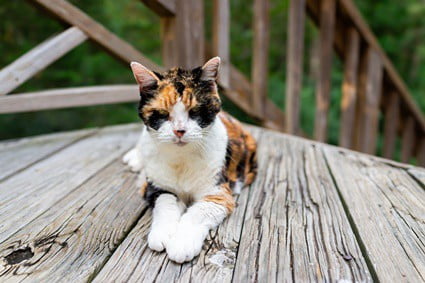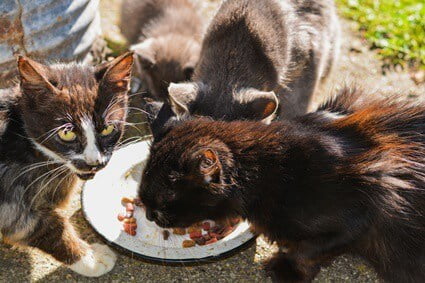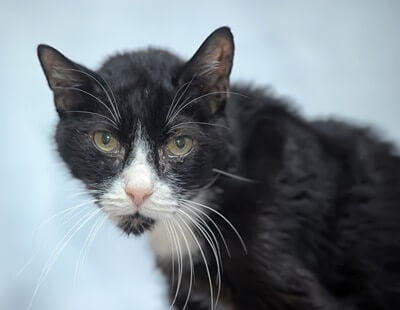It’s normal for cats to lose weight during their golden years, but there may be a medical problem that needs to be managed. Caring for an overly thin or skinny cat can be challenging for any owner, especially if your cat loses weight rapidly or without warning. This can be a sign of illness, disease, or organ failure.
To get your cat to eat high-calorie food and gain weight, warm up its meals and add flavors to stimulate appetite. Wet food is easier to chew, especially for older cats with bad or missing teeth. Free-feed your cat so that it doesn’t lose out on a meal due to temporary inappetence.
Place the food bowl away from the water bowl and keep other pets away to ensure that your cat doesn’t need to compete for its meal. Some cats are ‘affection eaters,’ so try stroking your cat while it eats. If your cat is losing weight rapidly or has stopped eating entirely, consult a vet without delay.
Is It Common For Older Cats To Lose Weight?
Elderly cats can lose weight because their metabolism slows down, so it becomes difficult to process food, resulting in reduced consumption. Also, they’re less physically active, so they start to lose muscle mass and appear to start wasting away.
Older cats can lose so much weight that they start to look skinny and bony. This is due to health complications from the aging process, such as hyperthyroidism, diabetes, arthritis, and renal failure.
Why Is My Cat Thin At The Back End?
The back end of a cat is usually narrower than the rest of the body. However, as your cat ages, its hindquarters will become thinner.
What To Feed An Older Cat That Is Losing Weight
Older cats require easy-to-digest protein and supplements to boost their vitamin and mineral intake. Senior-specific food is cut into smaller pieces and made softer, making it easier for an older cat to chew.
Perhaps your cat can no longer manage 1-2 large servings per day. If so, you need to give your cat more food servings, albeit in smaller portions.
If your cat has kidney problems, it’ll need a renal diet tailored for its needs. To prevent damage to a cat’s kidneys, meals must be lower in phosphorus and sodium.
Wet Food vs. Dry Food
Many senior cats struggle with eating dry food due to dental issues. Their gums and teeth may not be sufficiently robust to chew through such dense ingredients.
Some diseases, like hyperthyroidism, can make it hard for your cat to digest dry food. If your cat is having trouble eating, consider replacing its dry food diet with wet food.
Supplements
Your cat might need extra support to restore lost weight and maintain its health. If it’s not been eating for a while, the depletion of its vitamin and mineral stores will be an issue.
If your cat is in bad health, you can get higher-grade supplements, such as omega 6 fatty acids and glucosamine. Although cats rely on a protein-rich diet, they require other nutrients to keep their joints and bones healthy.
Best Way To Get A Senior Cat To Gain Weight
The best way to get a senior cat to gain weight is to provide it with food and water at all times. Cats love to eat small meals throughout the day rather than once or twice at scheduled times.
Your senior cat’s napping routine and playtimes may leave it without an appetite at those hours. By letting it free-feed (graze), it won’t go hungry.
Here’s how to get your senior cat to eat more frequently:
Make Food More Appetizing
Elderly cats can lose weight fast because their senses decline during their golden years. A loss of smell can cause your cat to lose its appetite, but you can restore it by:
- Adding aromatic ingredients
- Heating the food to enhance the aroma
Ensure that none of the flavorings and additives are bad for cats, such as spices.
Move The Food Bowls
If your cat is scared or nervous during mealtimes, consider changing its bowl’s position.
The bowl could be near a noisy air conditioner or boiler that’s scaring the cat. It may dislike having its water so close to its food or have to compete with rival pets.
Wet And Dry Food
Consider switching from dry food to wet food, depending on your cat’s preferences. Some cats struggle with eating dry kibble, especially those with bad teeth, so canned food is sometimes better.
Older Cat Eats But Losing Weight
If you have a senior cat that’s eating but losing weight, consider gradually changing its diet over the next 1-2 weeks. The food could be missing essential nutrients to keep it in a normal weight range.
According to Companion Animal Medicine, older cats derive more calories from protein-rich foods than younger cats. However, these foods must contain less phosphorus and sodium when a cat has kidney problems.

Diseases
Your cat may be losing weight despite eating due to thyroid issues. Hyperthyroidism is a common disease in senior cats, and it’s usually characterized by rapid weight loss.
Other chronic illnesses associated with weight loss in older cats include:
- Inflammatory bowel disease
- Diabetes mellitus
- Exocrine pancreatic insufficiency
Digestive Issues
Feline weight loss can often be attributed to gastrointestinal issues.
As cats grow older, their digestive systems are less able to break down foods. If your cat is eating well but losing weight, it may have digestive problems.
Organ Failure
If your old cat is losing weight but eating, it could be due to organ failure. Older cats are more susceptible to organ failure than younger cats, and a clear red flag is rapid weight loss.
Intestinal Parasites
Your senior cat might be eating well but lose weight due to intestinal parasites.
Common parasites include:
- Hookworms
- Tapeworms
- Pinworms
Diagnosing intestinal parasite infections can be difficult during the initial stages. As the infestation progresses, your cat will vomit, have diarrhea, and start losing weight.
Why Is My Senior Cat Losing Weight?
It’s common for senior cats to lose weight during their golden years. Some causes are attributed to medical conditions, while others result from poor eating habits.
Here are some common reasons:
Dental Problems
As cats grow older, they become more prone to dental issues. For example, periodontal disease and gum disease might cause your cat to stop eating properly.
Your cat might struggle to eat dry food, which could lead to weight loss if no alternative is available. Feed your cat softer food and take it to the vet for a dental checkup.
Feline Diseases
Cats become more vulnerable to illness in old age. Your senior cat may develop conditions, such as:
- Diabetes mellitus
- Hyperthyroidism
- Kidney disease
- Inflammatory bowel disease
These are all characterized by rapid weight loss.
Loss of Appetite
Your cat may be unable to taste, smell, or see its food any longer. Without these temptations, your cat may become disinterested in eating.
Poor Eating Habits
Your elderly cat might develop bad eating habits that lead to a reduction in its calorie intake. It may:
- Eat at random times
- Only eat from the middle its bowl
- Spend more time defending its bowl than eating the food
This can lead to weight loss over a short period. You can retrain your cat to develop good eating habits by doing the following:
- Feeding it separately from other cats
- Encouraging it to slow down
- Enticing it with new meals
Middle Age Spread
Middle-age spread is where fat accumulates around the butt and abdomen while leaving other parts of the body deprived.
Although middle-age spread is mostly seen in humans, it can also apply to your cat. Fat might accumulate around your cat’s belly, leaving the rest of its body looking skinny.
Poor Access To Food
In some situations, you offer enough food, but it isn’t capable of reaching its bowl. If you have more than one cat at home, the younger and more energetic cat might be eating all the food.
Causes Of Unexplained Weight Loss In Older Cats
Unexplained weight loss in older cats can be due to the following issues:
Stress and Anxiety
A stressed cat will lose its appetite for food and lose weight. Causes of distress vary from loud noises to dirty food bowls. Your cat may become apprehensive about eating due to strangers in the house.
Diabetes Mellitus
Diabetes mellitus develops due to the body’s inability to produce insulin or respond to it. If your cat has diabetes, it will start drinking water excessively, losing its appetite for food.
Cancer
Any form of cancer that affects the internal organs will always lead to gastrointestinal problems. When this occurs, your cat will be unable to eat and digest food properly.
Hyperthyroidism
Hyperthyroidism starts as a benign tumor in the thyroid glands, leading to the overproduction of thyroxine hormones.
Excess thyroxine hormones will result in:
- Muscle wastage
- Vomiting
- Diarrhea
- Increased urination
If left untreated, hyperthyroidism may cause heart disease or lead to death.
Dental Disease
Your cat may be losing weight due to a sore tooth. Toothache will lead to cats suddenly refusing to eat, resulting in weight loss.
Other dental problems such as gum disease, tooth decay, and periodontal disease may contribute to this problem. You should watch out for:
- Excess saliva
- Drooling
- Difficulty chewing
Kidney Disease
When your cat’s kidneys don’t function properly, they can’t remove toxins from the body, leading to muscle wasting as the disease progresses.
Other symptoms of kidney disease include:
- Suppressed appetite
- Excessive weakness
- Lethargy
Severe Weight Loss in Senior Cats
There’s a big difference between gradual weight loss in an older cat and severe weight loss. If your cat has lost a large amount of weight quickly, that does narrow down the causes. You should look out for:
Gastrointestinal Problems
Senior cats are more susceptible to developing gastrointestinal problems. Any issue that affects digestion will always lead to severe weight loss.

Organ Failure
The metabolism of a cat declines as it gets older. In serious cases, this decline may be attributed to organ failure.
As your cat reaches its twilight years, some of its organs begin to wear down and may eventually fail. Organ failure will subsequently lead to bodily malfunctions, and your cat will start to lose weight rapidly.
Feline Infectious Peritonitis
Feline infectious peritonitis attacks the gastrointestinal tract of cats leading to wasting. If your cat has this condition, it’ll rapidly lose weight. Fortunately, this disease is treatable.
How To Make My Cat Gain Muscle
While your cat may regain weight relatively quickly, muscle mass takes longer to develop.
Here’s how to increase your cat’s muscle mass:
Variety of Foods
Cats can become tired of being fed the same type of food every day. Giving your cat options by changing its diet can improve its appetite—mix-and-match between different flavors.
Quality Proteins
Older cats derive their calories more from protein-rich foods. If you want your skinny senior cat to gain muscle, add more quality proteins. Avoid diets that have any filler or empty calories.
Textures of Food
As cats get older, they begin losing their preference for certain foods. You may notice that your cat now prefers wet food instead of dry food, or vice versa. This may be due to dental problems or weak gums.
Regardless, experimenting with different textures can make a huge difference. The change should be gradual to give your cat enough time to adjust to its new diet.
Movement
According to Medicine, older cats that move less tend to lose muscle mass more quickly.
So, encourage your cat to stay active. You can achieve this by playing with your cat or giving it toys that will entice it to play. Always reward regular movement with special treats.


hi what food can you reccomend for an older cat who is thin something high in protein
Hi can over grooming cause issues as well? He seems to groom a lot and the vomit hair. Then doesn’t want to eat much but act’s hungry.
Arthritis?